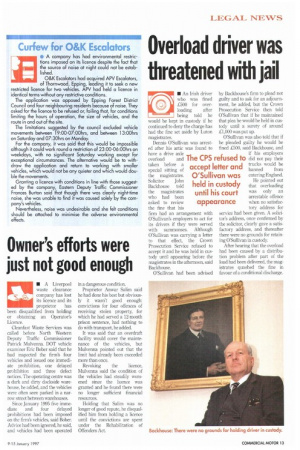Overload driver was threatened with jail
Page 15

If you've noticed an error in this article please click here to report it so we can fix it.
• An Irish driver who was fined £500 for overloading after being told he would be kept in custody if he continued to deny the charge has had the fine set aside by Luton magistrates.
Dennis O'Sullivan was arrested after his artic was found to have a drive axle overload and taken before a special sitting of the magistrates.
Solicitor John Backhouse told the magistrates who had been asked to review the fine that his firm had an arrangement with O'Sullivan's employers to act for its drivers if they were served with summonses. Although O'Sullivan was carrying a letter to that effect, the Crown Prosecution Service refused to accept it and he was held in custody until appearing before the magistrates in the afternoon, said Backhouse.
O'Sullivan had been advised by Backhouse's firm to plead not guilty and to ask for an adjournment, he added, but the Crown Prosecution Service then told O'Sullivan that if he maintained that plea he would be held in custody until a surety of around £1,000 was put up.
O'Sullivan was also told that if he pleaded guilty he would be fined £500, said Backhouse, and if his employers did not pay their trucks would be banned from entering England.
He pointed out that overloading was only an arrestable offence when no satisfactory address for service had been given. A solicitor's address, once confirmed by the solicitor, clearly gave a satisfactory address, and thereafter there were no grounds for retaining O'Sullivan in custody.
After hearing that the overload had been caused by a distribution problem after part of the load had been delivered, the magistrates quashed the fine in favour of a conditional discharge.
































































































